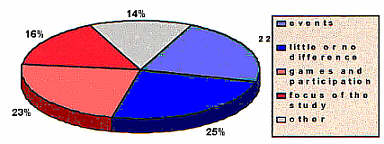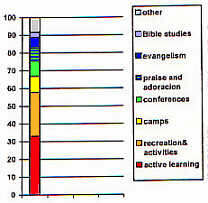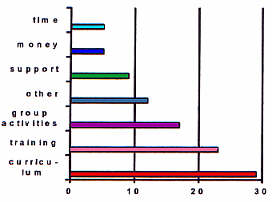Given two one-hour sessions to say whatever we want to people who are working with youth, we have two goals:1) to encourage them that the work they are doing is significant to the kingdom of God,
2) to provide them with very practical tools to help them in their ministry. We thought you might be interested in hearing some of what we’re passing on to them to help you understand a little more specifically what we’re doing here.
When did you make a personal commitment to Christ? If you’re like over 80% of people, you made that decision before you were 20 years old. YOUTH: WHY WORKING WITH THEM IS CRUCIAL
Experts say that between the ages of 13 and 24 people solidify their core values. After age 24 the values they have don’t change much. This process involves analyzing and testing values handed down to them by their family and society. This critical analysis is a necessary step in a person’s development and is significantly helped when they have someone mature and trusted to come alongside them through the process (like a youth minister.) Ideally parents would fill this role, but often it is the parents' values that the teen is testing. WHY ARE YOUTH OFTEN CHARACTERIZED BY REBELLION?
WHY HAVE MOST SIGNIFICANT CULTURAL CHANGES AND REVOLUTIONS BEEN FUELED BY YOUTH? Youth are often characterized by idealism. They are naïve enough to believe they can change the world... and amazingly enough they often do. Just look at what young people accomplished in Tienamen, the Philipines, Indonesia, Europe in the 30's and 40's, and the entire western world in the 60's. One reason they are such change agents is that they don’t have as much to loose as older adults, ie: cars and houses, careers, investments, social standing, etc.
The teens and early twenties are a strategic stage in a person’s life, when he/she is searching to understand God, the world and the self. There is an openness to the Gospel and a willingness to get involved that is unparalleled in the following years.
What percentage of Mexico’s population is in this impressionable category? An incredible 41% of Mexicans are between the ages of 13-26 years old. MEXICAN YOUTH: AUTHORS OF CHANGE IN THE CHURCH OF THE 21ST CENTURY
What kind of an impact is the church having on them? That's hard to measure, but what we can measure is their attendance in church and involvement in youth activities. From our research of over 200 churches from 22 different states, of 167 members in the average congregation, 44 of them are youth but only 22 of those participate in the youth activities. That means that the church is only 27% youth - instead of the 41% found in the community at large. But even sadder is that only half those are involved in the youth ministries that the church offers.
We’re encouraged by the fact that 44% of the people we surveyed have been working with the youth program of their church for over 4 years. This shows a high level of dedication among leaders - especially considering that 93% of them are volunteers. So building into these leaders can have long term results. IS THERE ANY GOOD NEWS?
So why isn’t the church here even reaching the it’s own youth? Of course there are many factors, to start with youth work is not a priority for the churches. Most churches are struggling to pay their pastor and the basic maintenance costs. And less than 10% of churches designate any part of their budget for youth ministries. So a paid staff person for youth is out of the question for all but the largest of churches. JUST BETWEEN YOU AND ME
Another factor is the way the youth programs work. We asked “In your church what is the difference between the youth and the adult ministries?” You can see from graph “A” that a surprising 25% said that there is little or no difference. One person told us, “There is no difference, but the youth are more apathetic.” Hmmm, I wonder why? Another 22% told us that the difference lies in outside activities like sports, parties, or camps. So almost half of churches are not gearing the spiritual content or the format of their youth meetings for the youth. Much of this is due to the fact that less than 15% of youth workers have any youth ministry training. The good news is that 40% said the difference lies in the content or format of the meetings - which is on target.
our kids looking into what the Bible has to say about their lives and relationships We want to encourage those whose youth “program” is just a dry mini-church service to make their time together more interactive and focused on what the Bible has to say about the problems and questions in the lives of students and young adults.
Graph A. Answers to the Question:
WHAT’S THE DIFFERENCE BETWEEN YOUTH AND ADULT MINISTRY IN YOUR CHURCH 
We can build our discussion of youth work how to’s on what Mexicans have told us is successful in their work with youth: a more active and dynamic teaching style and activities for fellowship. You can see in graph “B” what our survey found as the key elements that improve ministry to youth. Our workshops for youth leaders are intentionally fun and interactive to model a learner based, rather than a teacher based approach.
Graph B.
WHAT MEXICAN YOUTH WORKERS SAY IS EFFECTIVE IN THEIR MINISTRY Graph “C” shows what Mexican youth workers describe as their greatest needs. We can’t give them more time or money, but we hope to give them both emotional support as well as tangible help in the areas of group dynamics,
kids from our group having fun activities, and active curriculum resources. We share with them steps to make any meeting or Bible study more interactive and provide them with a bibliography of the best books and studies available here.
Graph C.WHAT MEXICAN YOUTH WORKERS SAY THEY LACK IN THEIR MINISTRY
23% said that training is what they need in order to improve their ministry. This encourages us because that is exactly what we have to offer. Thank you so much for your partnership in this exciting work through your prayers and support.
back to the TOP
NOTE #1: From our research we've found that "youth" is roughly defined as between these parameters. In Mexico and most of Latin America, you are still considerd a "teen" or "youth" until you're married or in your 30's (GO BACK)


